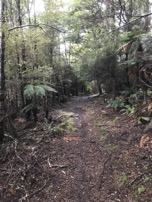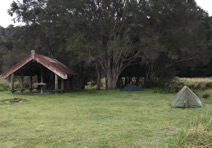October 2019
Lessons from a Hike (1)
21/10/19 Filed in: Change
L asts week I completed my first Great Walk in New Zealand, the Lake Waikaremoana Great Walk. It was a 4-day slog/jaunt/hike/trial/trek/exploration experience. The first day was cool and cloudy. The next two days were cold and rainy. The final day was a stunner…warm and dry! I would say it was the 2nd hardest physical thing I have ever done…ever. When I finished it, I was "one-and-done"! But now, three days later, I'm already planning my next one.
asts week I completed my first Great Walk in New Zealand, the Lake Waikaremoana Great Walk. It was a 4-day slog/jaunt/hike/trial/trek/exploration experience. The first day was cool and cloudy. The next two days were cold and rainy. The final day was a stunner…warm and dry! I would say it was the 2nd hardest physical thing I have ever done…ever. When I finished it, I was "one-and-done"! But now, three days later, I'm already planning my next one.
I have often thought of our walk through life as a hike like this. I have, like many other counsellors, often referred to our life experiences as a journey. As such, I see many comparisons between what I did last week and the journey we are on to make changes in our life for the better. Over my next several blogs, I'd like to share with you some of my observations.
1. Plan all you want but there has to be a point where you just choose to start. I have been known as an organiser all my life. Note: organiser doesn't necessarily mean neat. (That's for my wife and mum). I have even said I have the ability to organise the fun out of anything! I planned for this trip for several months. I researched equipment, food, and maps. I purchased some things specifically for this trip that I knew would be vital (more on that later). I watched weather reports, and found the best time of year to go for what I wanted (solitude without freezing weather). The week before I was to go I found the weather was going to be terrible. I hadn't dropped all the weight I wanted. I was questioning some of my food and equipment choices. I was even encouraged by well-meaning friends and family to skip the trip and go another time. But I had to go. I knew there would always be ways to be just a bit better prepared. But I also knew a desire to be just a bit better-prepared would keep me from ever getting on the trail if I let it.
weather reports, and found the best time of year to go for what I wanted (solitude without freezing weather). The week before I was to go I found the weather was going to be terrible. I hadn't dropped all the weight I wanted. I was questioning some of my food and equipment choices. I was even encouraged by well-meaning friends and family to skip the trip and go another time. But I had to go. I knew there would always be ways to be just a bit better prepared. But I also knew a desire to be just a bit better-prepared would keep me from ever getting on the trail if I let it.
Perhaps you have been thinking about a change for a while: stopping some bad habits and starting some good ones, working on your relationship, focusing on becoming a better version of yourself, seeing a counsellor, etc. You have thought about why you want to change. You've identified some strategies for change. You've even acknowledged some of the obstacles you will have to face. And you may have lists - growing lists - that you find helpful in embarking on this journey. That's all well and good. But there has to be a time where you say, "OK, enough planning. Let's get going!" You will find your planning was helpful in some aspects, but you will also find there was no way you could plan for everything. No worries! Once you start on the path, you will find you are much more resourceful than you might have originally thought. And you can keep going!
2. Hike your own hike. Don't compare yourself to how others are hiking. When I got off the water taxi to start the hike, five other guys got off at the same time. Four were in their 20s and one guy was about my age. They all immediately took off, with me following closely behind. However, when we arrived at the first small uphill, it became very obvious that my low level of fitness and high level of backpack weight was going to drastically slow me down! And in no time the distance between me and the last hiker ahead increased exponentially. I had a choice at that moment: try to keep up with their pace or slow down to one that worked for me. I had to realise that for me to try to keep up with them, even the guy my age (who I found out later had been doing this for years), would have been a disaster for me. And you know what…we all arrived at our destination that day, yes, at different times - but we still got there.
One of the easiest ways for you to get off track in making life changes is to compare yourself to others. Sometimes we get off track by comparing ourselves to those we think are not doing as well as we are. We say, "Well, I'm better off than she is, so maybe I need to relax my self-expectations." And then we even use that comparison to justify stopping the growth process when it gets difficult. But most often, we compare ourselves to those we feel are doing much better than us. "I'll never get my life together as well as he has his life together. Why even bother trying?" Your life is your life. No one can live it for you. No one knows all that you have been through. No one has your set of experiences, skills, learnings, and giftings. Hike your own hike. You will reach your destination. It will be faster than some and slower than others. But you will get there, and that's what the hike is about. Not being first or avoiding last. But completing the journey.
3. Expect the unexpected. That's kind of an old worn-out phrase, but it's worn-out because it is so true. All along that first day, I was surprised by various things: a very muddy path, an unexpected short climb, a slip and fall, a bird flying directly across my path as close as he could get, etc. When I arrived at my tent sight the first night, the set-up spots weren't like I expected. There wasn't as much cover as I had hoped for. It was colder sooner. The list goes on. All this reminded me that I could have planned for years and still have come against unexpected events. But I was able to adjust and adapt. And here I sit — warm and dry three days later. The unexpected didn't stop me.
When I arrived at my tent sight the first night, the set-up spots weren't like I expected. There wasn't as much cover as I had hoped for. It was colder sooner. The list goes on. All this reminded me that I could have planned for years and still have come against unexpected events. But I was able to adjust and adapt. And here I sit — warm and dry three days later. The unexpected didn't stop me.
In your life's journey, you have learned to expect the unexpected. That's not always a pleasant life lesson, but it is true. I have met so many people who are desperately trying to control every aspect of their life. And they're highly frustrated by the inability to do so! I often tell people, "We can barely control ourselves, let alone anyone or anything else." Once we come to grips with that truth, we are then free to employ our strengths and experiences in adjusting and adapting to unexpected changes. Matter-of-fact, if things are not changing, there is something seriously wrong in your life! So don't only expect the unexpected, but embrace the unexpected. It's there where real growth can happen.
Next week, we'll look at a few more comparisons between hiking and walking along life's journey. This week, have a think about the three above. Maybe do some writing about how that will impact you in a positive way this week.

I have often thought of our walk through life as a hike like this. I have, like many other counsellors, often referred to our life experiences as a journey. As such, I see many comparisons between what I did last week and the journey we are on to make changes in our life for the better. Over my next several blogs, I'd like to share with you some of my observations.
1. Plan all you want but there has to be a point where you just choose to start. I have been known as an organiser all my life. Note: organiser doesn't necessarily mean neat. (That's for my wife and mum). I have even said I have the ability to organise the fun out of anything! I planned for this trip for several months. I researched equipment, food, and maps. I purchased some things specifically for this trip that I knew would be vital (more on that later). I watched

Perhaps you have been thinking about a change for a while: stopping some bad habits and starting some good ones, working on your relationship, focusing on becoming a better version of yourself, seeing a counsellor, etc. You have thought about why you want to change. You've identified some strategies for change. You've even acknowledged some of the obstacles you will have to face. And you may have lists - growing lists - that you find helpful in embarking on this journey. That's all well and good. But there has to be a time where you say, "OK, enough planning. Let's get going!" You will find your planning was helpful in some aspects, but you will also find there was no way you could plan for everything. No worries! Once you start on the path, you will find you are much more resourceful than you might have originally thought. And you can keep going!
2. Hike your own hike. Don't compare yourself to how others are hiking. When I got off the water taxi to start the hike, five other guys got off at the same time. Four were in their 20s and one guy was about my age. They all immediately took off, with me following closely behind. However, when we arrived at the first small uphill, it became very obvious that my low level of fitness and high level of backpack weight was going to drastically slow me down! And in no time the distance between me and the last hiker ahead increased exponentially. I had a choice at that moment: try to keep up with their pace or slow down to one that worked for me. I had to realise that for me to try to keep up with them, even the guy my age (who I found out later had been doing this for years), would have been a disaster for me. And you know what…we all arrived at our destination that day, yes, at different times - but we still got there.
One of the easiest ways for you to get off track in making life changes is to compare yourself to others. Sometimes we get off track by comparing ourselves to those we think are not doing as well as we are. We say, "Well, I'm better off than she is, so maybe I need to relax my self-expectations." And then we even use that comparison to justify stopping the growth process when it gets difficult. But most often, we compare ourselves to those we feel are doing much better than us. "I'll never get my life together as well as he has his life together. Why even bother trying?" Your life is your life. No one can live it for you. No one knows all that you have been through. No one has your set of experiences, skills, learnings, and giftings. Hike your own hike. You will reach your destination. It will be faster than some and slower than others. But you will get there, and that's what the hike is about. Not being first or avoiding last. But completing the journey.
3. Expect the unexpected. That's kind of an old worn-out phrase, but it's worn-out because it is so true. All along that first day, I was surprised by various things: a very muddy path, an unexpected short climb, a slip and fall, a bird flying directly across my path as close as he could get, etc.

In your life's journey, you have learned to expect the unexpected. That's not always a pleasant life lesson, but it is true. I have met so many people who are desperately trying to control every aspect of their life. And they're highly frustrated by the inability to do so! I often tell people, "We can barely control ourselves, let alone anyone or anything else." Once we come to grips with that truth, we are then free to employ our strengths and experiences in adjusting and adapting to unexpected changes. Matter-of-fact, if things are not changing, there is something seriously wrong in your life! So don't only expect the unexpected, but embrace the unexpected. It's there where real growth can happen.
Next week, we'll look at a few more comparisons between hiking and walking along life's journey. This week, have a think about the three above. Maybe do some writing about how that will impact you in a positive way this week.
Five Tools to Use with Depression (part 2)
07/10/19 Filed in: Depression

Setting Goals. This is helpful in getting you moving forward through the mud of depression. I often encourage people to find the right personal balance in setting goals. You don't want them so big that they are unattainable on your best day, but you also don't want them to be so small that you don't get any benefit from accomplishing them. Your goal might be to get out of bed by 10:00am. It might be too organise a dresser drawer. It might be to read this entire post. It might be to take a walk or a bike ride. It might be something bigger that requires several steps before the goal is reached. The key is to have some target that feels you are making some sort of progress for the day.
Changing Thinking. When depression hits, we tend to get into a cycle of "stinkin' thinkin'". We want to feel better, but our thinking tends to get in the way. For example, you might say, "I know I should get out and take a walk, but I don't feel like it." If I heard someone say that, I would suggest two changes to the thought processes. First, what happens if you change "should" too "would like to"? It kind of takes the pressure of guilt off, doesn't it. Guilt is NEVER a good motivator! Second, do the Double But. We tend to run to the first but when we're not feeling good. Trying to stop the first but is, in my opinion, wasted energy. So I say, go ahead and think the first but…but don't stop there. Double-but the but. "I would like to get out and take a walk, but I don't feel like it. BUT I can at least put my shoes on." That second but moves you forward and makes the next step a bit easier. Whatever but you stop on holds the power. Give the second but that boost.
Relaxation. Do some deep breathing. Soak in a tub. Listen to the birds. Do what helps you relax. Sometimes depression gets stronger when we are trying to do too much and we don't have time to recharge. Give yourself space and permission to relax.
Activity. Endorphins. Even non-medical people have heard about these nice little natural wonder guys. They're your body's chemicals that make you feel better when you are active. And they're just itching to get to work, but they need you to do some kind of activity to warm them up and get them flowing. It doesn't have to be a hard one-hour workout at the gym. It can be a gentle walk, a slow bike ride, a wander through the gardens. Just do some kind of activity that lets your endorphins know they can get busy.
Problem Solving. Working through some sort of problem, no matter how small it is, can help you see progress. Problems often feel like the black cloud hanging over you, or something ominous just out of eyesight. Writing a simple plan, carrying out one step at a time, making progress towards the removal of that cloud can often help you move toward the shallower end of the depression mud pool.
Now again, just as a reminder, please don't try to use all five of these at the same time. Two at the most. And if you find those two aren't working, then experiment with some of the others.
And as always, if you want to work through the depression you are experiencing with someone, please feel free to contact me. I am more than willing to walk with you through this part of your life journey.
